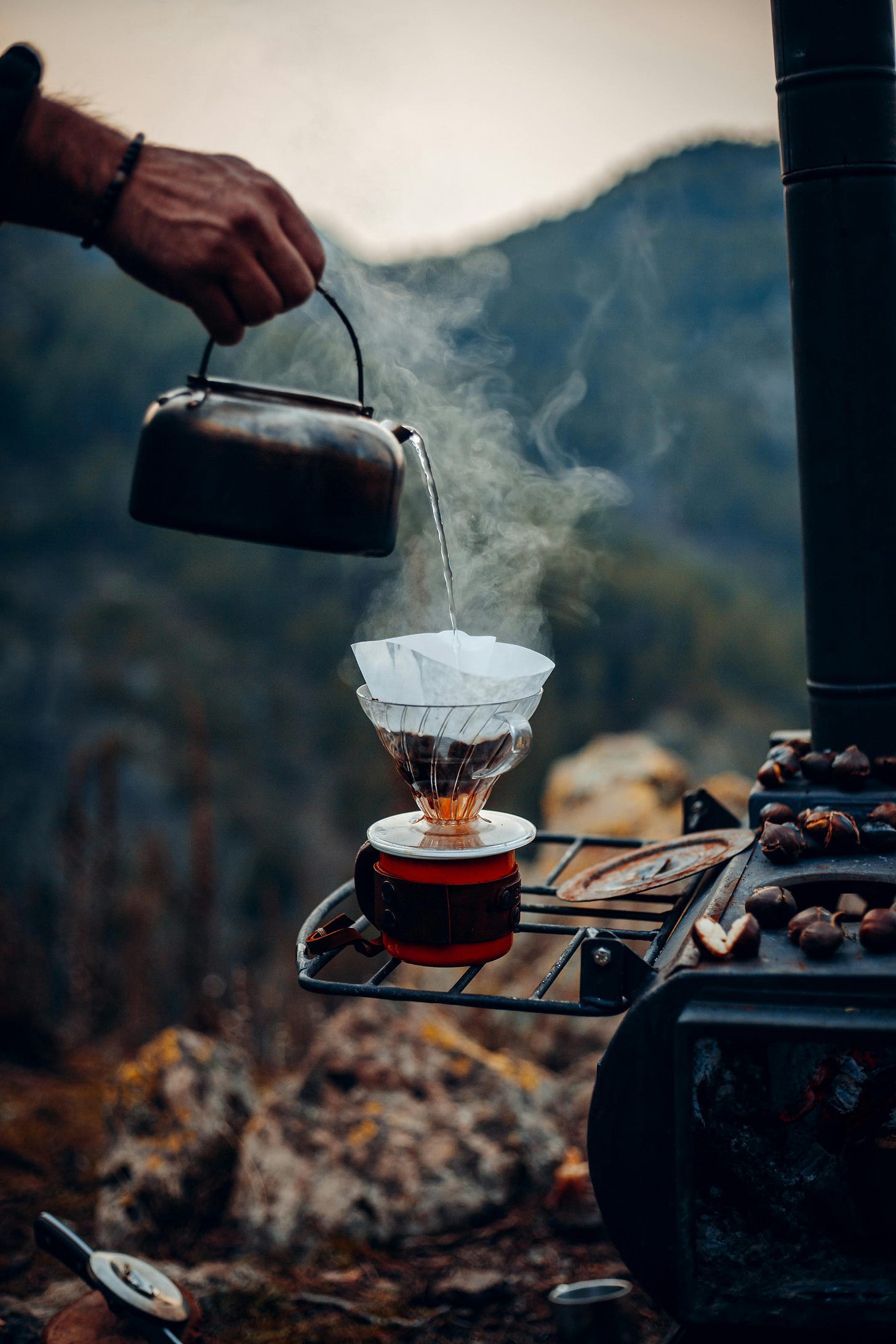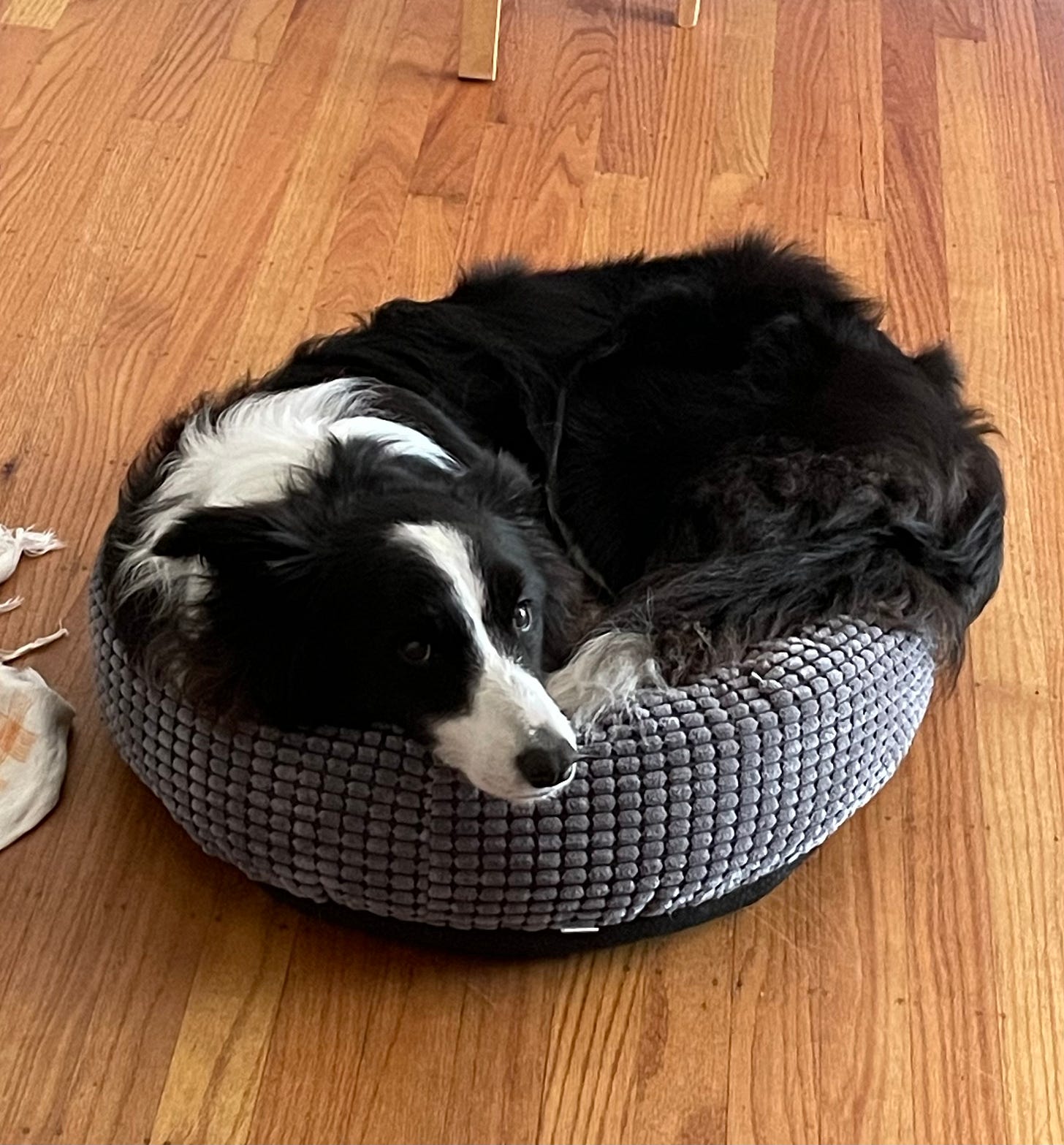My Unexpected Relationship With Coffee
From abstinence to addict
Welcome to another edition of Beyond Self Improvement! If you missed it, here’s last week’s article: My Lifelong Struggle with Being “Skinny” and How I Overcame It.
Today’s essay will explore how I went from abstaining from coffee for the first thirty-four years to drinking three cups a day.
If you’re new, consider subscribing below to join our growing community and get the next essay direct to your inbox:
Dear Friend,
My first encounter with coffee was a curious, almost strange experience.
My parents drank Taster’s Choice instant coffee, which they zapped in the microwave. I often wondered, “Isn’t it supposed to be ground and brewed?”
Seeing this as a teen turned me off of coffee for years.
After college, I entered the workforce just as the specialty coffee boom began. I discovered why adults loved coffee so much. I spent five years in the industry, managing Starbucks and independent shops and selling espresso equipment. Starbucks rigorously trained us, teaching us about the distinct flavors of beans from different regions.
Despite being immersed in this world, I only tasted coffee, never truly drinking it. I feared becoming addicted. To me, addiction meant weakness, and as a young man, I didn’t want to be weak.
I wanted to be in control of my life, not controlled by something I couldn’t even see.
But at thirty-four, I began drinking coffee regularly due to a series of conditions. I started practicing yoga, where I met my ex-wife, who enjoyed drinking it. Learning the middle path taught me about extremes, and I wondered if I was too strict about not drinking coffee (or eating sugar). Perhaps it was time to stop denying myself one of life’s great pleasures. After all, there’s truth to the cliche that you only live once.
Soon after meeting, my ex-wife gave me a cold-brew coffee maker as a birthday gift. I loved the smooth, caramel-like, syrupy taste and was instantly hooked. Since then, I’ve experimented with French press and pour-over, influenced by the third wave of specialty coffee.
Every few months, I stop drinking coffee for two or three weeks to prove to myself that I’m not addicted. Usually, I experience painful headaches for two to three days. However, after a few years without taking a break, I began to worry. Was I addicted?
I realized that coffee addiction is about more than caffeine.
It’s about our emotional and social connections, culture, comfort, conversation, availability, acceptability, and connecting with others. The shared daily ritual with my partner makes taking breaks that much harder.
I took a break from coffee two and a half years ago while vacationing in Puerto Vallarta. After a week without it, I felt calmer and more at ease. My natural energy began to return, and I felt more at peace. The short break showed me that I didn’t need coffee to function.
Last year was particularly stressful.
I was raising my partner’s teens, starting a new career, maintaining a house, and drinking up to three cups a day to keep up. But instead of feeling more energized, I felt increasingly worse. Paradoxically, the more I drank, the less effect it had on me, and the more I needed to get the same high to power me through a productive day.
I felt unsettled and out of control, and I realized that coffee had become a compulsion.
The first cup was excellent and satisfying, but the second and third were rough, bitter and underwhelming, even unpleasant. Coffee went from being a source of pleasure to a must-have vehicle for delivering caffeine.
But the worst part was the cycle of addiction.
I would wake up tired and in need of caffeine. Then, I would drink through mid-afternoon. I would keep working into the evening, and I wasn’t exercising due to an injured shoulder. I was so busy that I wasn’t even taking daily walks, a daily ritual for a dozen years. I wasn't sleeping well because of the caffeine, daily stress, long hours, and lack of exercise. Then, I would wake up tired, have a headache, or both, and need caffeine.
The cycle would start all over.
For the past few months, I’ve been limiting myself to two cups of coffee a week—Sundays and one other day. This balance allows me to enjoy coffee without feeling controlled by it. However, the lure of drinking more is ever-present. If I wake up tired or with a headache, I feel a strong pull to drink a cup.
As with all of life’s pleasures, coffee is a slippery slope.
The more I indulge, the more I want it until wanting turns to craving. And we all know what craving gets us and how hard it is to quit once we reach that point. So, living with an addiction requires tremendous discipline, which seems to be in increasingly limited supply these days.
Yet I know I can quit altogether if I went without coffee for the first thirty-four years, including working in the industry. Then again, that’s what every addict says.
Keep tinkering,
Ryan
That’s all for this week.
See you next Wednesday.
My biggest passion is working 1:1 with readers like you.
Whenever you’re ready, I can help you stop waging war with yourself and start being your best friend. Schedule a free, 30-minute discovery call now.
P.S. If you found this article helpful, please share it with someone who might benefit from it.




The ritual and connection around coffee are huge. I was more of a social coffee drinker, but my body has told me in no uncertain terms that it *does not* want coffee. But I love the smell and miss the taste, and miss the connecting process of making and drinking it while hanging out with my husband – and he laughs and says he feels pretty much the same about alcohol.
Wow, this was great! I always suspected coffee could be an addiction, but the way you describe it makes it even more real. I knew someone who would get caffeine headaches if he didn't have a cup before noon.
I like a cup every morning to start my work day, and I see now that I'm lucky there's no real pull for more. I too didnt get into coffee until i was older; maybe halfway througu college. And i still didnt drink it constantly. Once i started working, though, is when I began a cup a day. Then when I spent 3 months on the Appalachian Trail, I abruptly was cut off from coffee. I'd get it maaaaaybe once a week in town if I was lucky. It was interesting being able to get up and begin hiking, no caffeine in sight. And yet I'd be awake and alert!
Sorry for the rant; I hadn't even thought about that stuff for a while until I read your article.